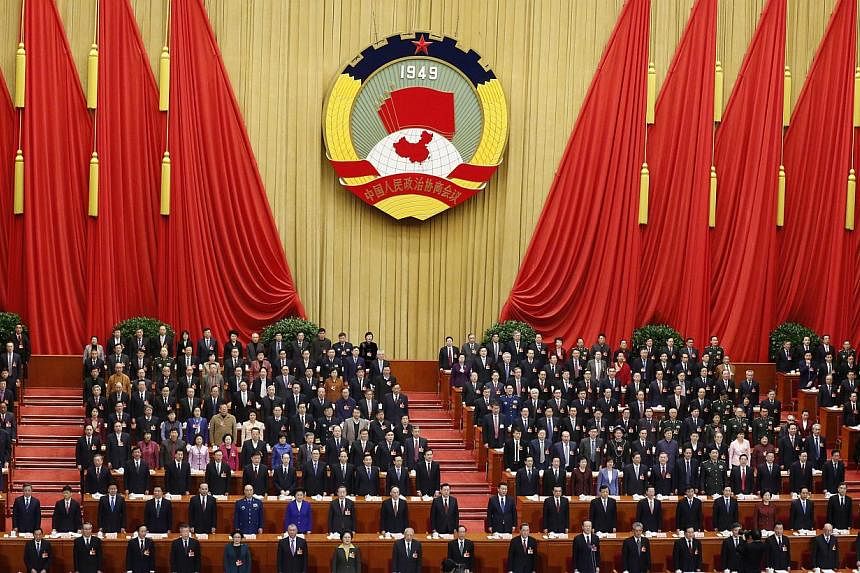The annual sessions of China's parliament and its advisory body, known as "liang hui", open this week in Beijing.
Both sessions are closely followed by global markets and political watchers for future direction on the world's number two economy.
Here's what you need to know about the country's top political event:
What is "liang hui"?
"Liang hui", which means two meetings in Mandarin, refers to the annual sessions of the National People's Congress (NPC) - China's legislature - and the Chinese People's Political Consultative Conference (CPPCC) - an advisory body.
The sessions officially began on Tuesday with the opening of the CPPCC session, which ends on March 13. The NPC session, the more keenly watched event, starts on Thursday (March 5) and ends on March 15.
The NPC's nearly 3,000 delegates will review and endorse the government's work in the past and coming year, pass new laws, approve the budget, and ratify personnel changes. The CPPCC's 2,200 delegates will discuss and make policy suggestions to the government.
What's significant this year?
The Chinese leadership has defined 2015 as a crucial year for comprehensively deepening of reforms unveiled at the Third Plenum, the CCP's policy-setting summit, in 2013. It is also the first year of comprehensively promoting the rule of law, and the final year of the 12th Five-Year Plan period (2011-2015). All three themes are set to dominate the liang hui.
After more than three decades of a yearly average of nearly 10 per cent in economic growth, China's leaders are aiming for higher-quality growth, with lower environmental cost, less systemic risks and narrowing income gaps.
As a result of the national anti-graft drive, 30 deputies of China's top legislature and eight members of CPPCC have been dismissed or forced to resign since March 2014 after they were placed under investigation for corruption. According to officials, 31 newly elected deputies to the NPC and 13 new CPPCC deputies will fill vacancies before the annual two sessions begin.
What's on the NPC agenda?
1. Political
- Anti-corruption:
A preview of the meetings by the People's Daily - the Communist Party's mouthpiece - suggested that new "tigers", or powerful political figures, might be announced this year and that the leadership will discuss ways to improve regulations to better prevent corruption.
-Defence spending:
China is expected to authorise robust 2015 defence spending largely to beef up the navy with anti-submarine ships and develop more aircraft carriers beyond the one vessel in operation.
- Legal reforms:
Implementing the "rule of law" has become a priority of Beijing since the Fourth Plenum last year and China is expected to take steps to make progress on the more than 180 reform tasks highlighted at the key policy summit. Lawmakers will also discuss a draft amendment to the country's Legislation Law.
If passed, the law will allow local legislative bodies to make laws, as opposed to only regulations implementing laws. The change would enlarge legislative powers at the local level.
2. Economy
- GDP target:
An economic "new normal" featuring lower but better quality growth might see the GDP growth target lowered to 7 per cent from 7.5 per cent last year, a new low since 2004.
SOE reforms:
- Reform of the notoriously inefficient state-owned enterprises (SOEs) could also pick up speed to free up more room for the private sector. Premier Li Keqiang could also set a new job creation target of about 10 million, similar to last year's target.
3. Social
- Anti-pollution initiatives:
A recurring theme after Beijing pledged war on pollution last year, China is expected to step up its fight against the suffocating smog and dirty rivers plaguing its cities. The issue has risen to the top of the political agenda as frustrated citizens increasingly make their displeasure heard.
- Pushing reforms to the hukou system:
After kickstarting hukou reforms last year, Beijing is expected to do more to make the system more equitable so that social welfare for its citizens is not linked to household registration. Migrants, especially in large cities, are expected to benefit from these changes.
4. Foreign policy
- President Xi Jinping's "One Belt, One Road" initiative:
Details of the initiative, which refers to Beijing's plan to revive economic development along the ancient Silk Road, and a maritime Silk Road, are eagerly awaited. It is meant to deepen economic connections between China and the rest of the world.

